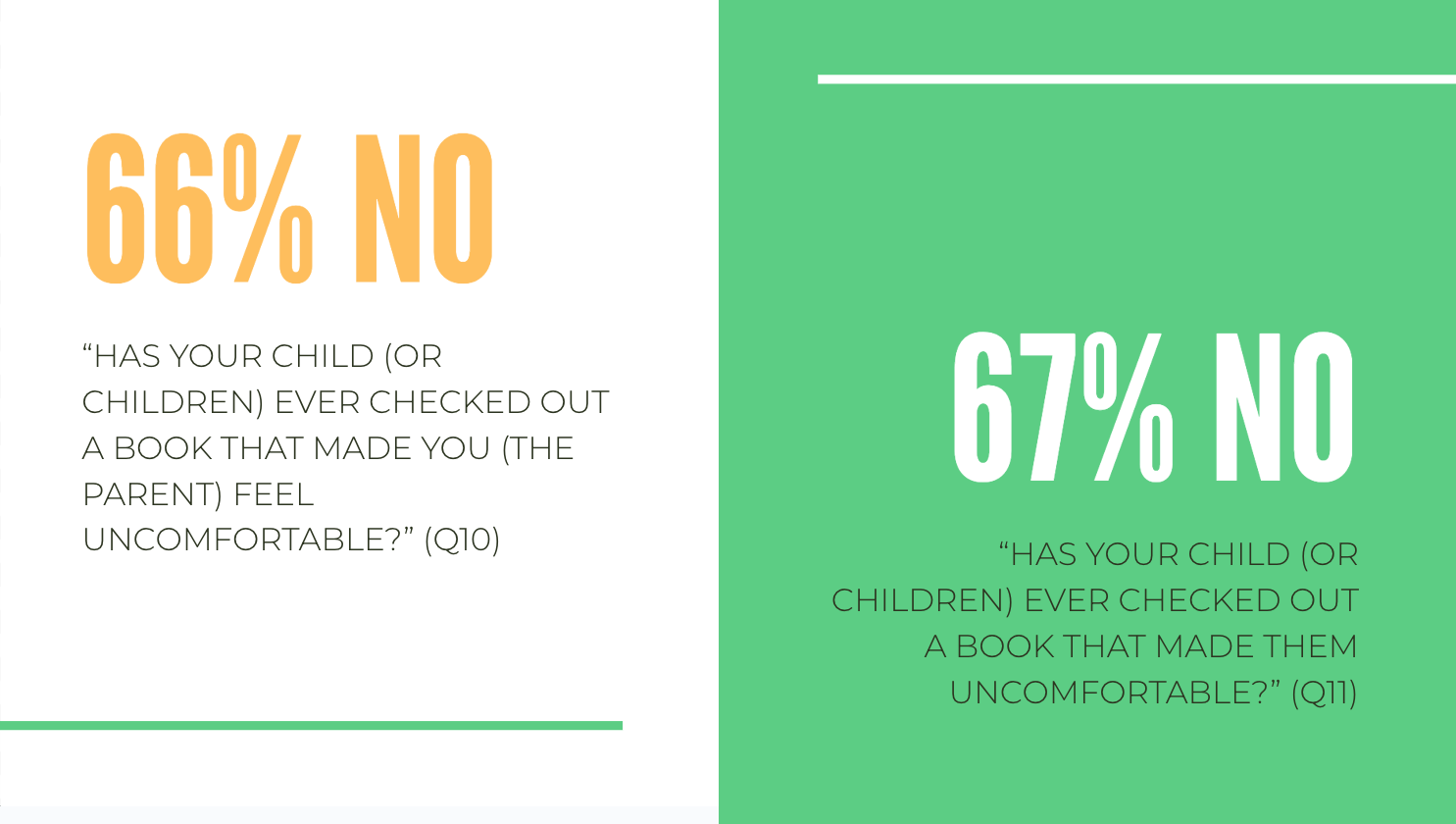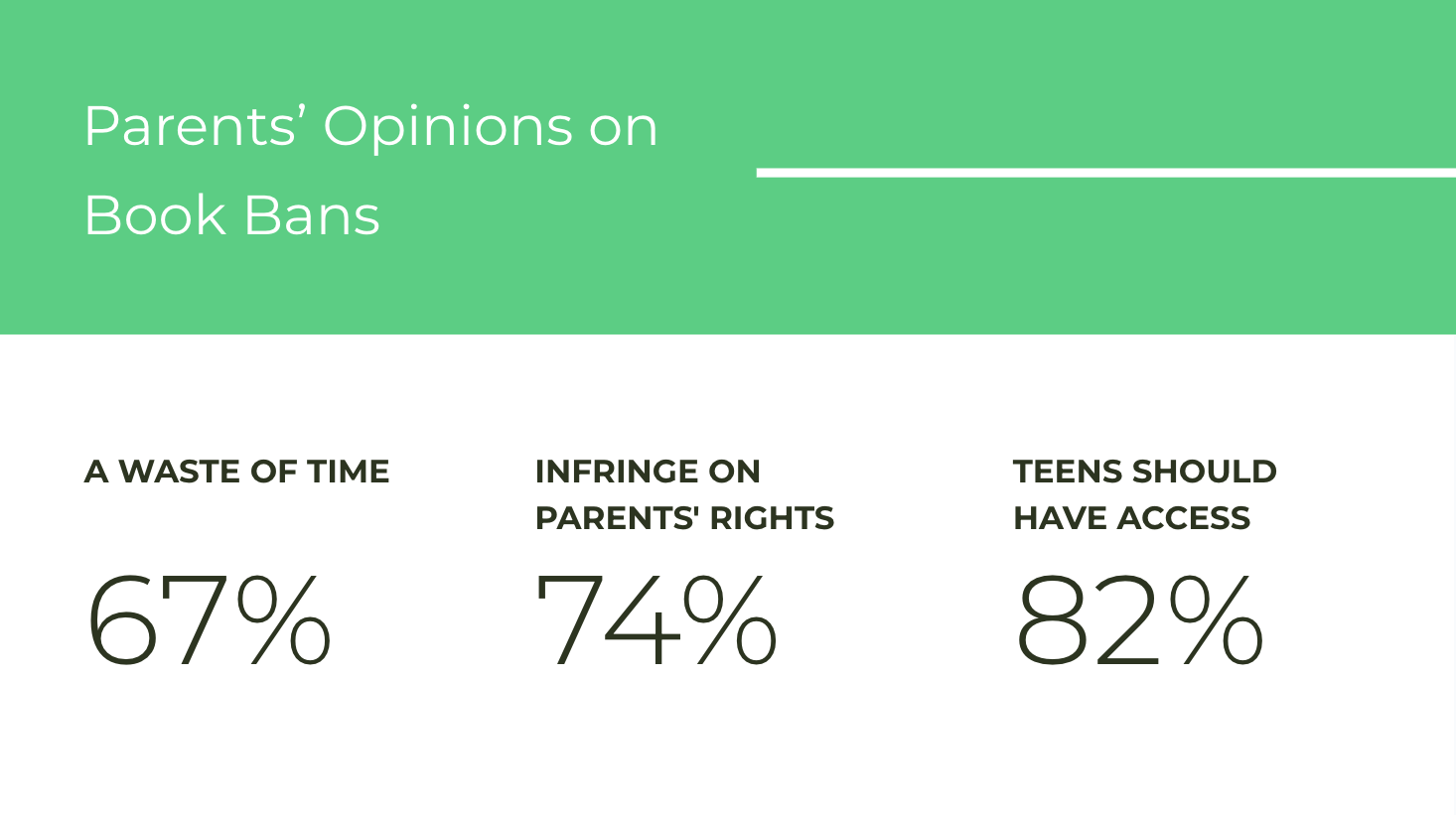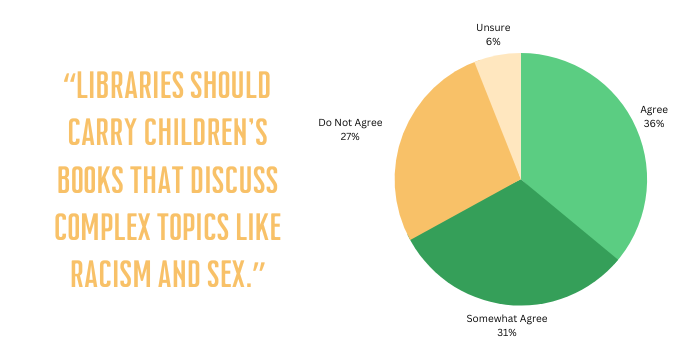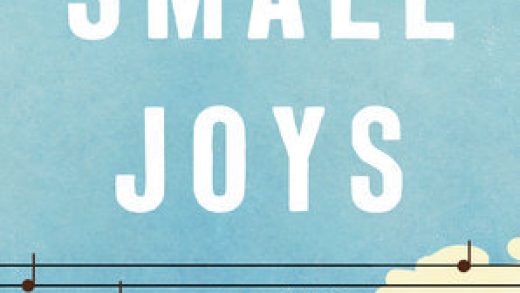On September 27th, we shared the results of EveryLibrary and Book Riot’s survey on parent perceptions of public libraries. This has been such a valuable partnership, and the results are fascinating — in both promising and concerning ways. This is the first of three planned surveys, so expect to see more of our results very soon. Kelly and I have been working on this for quite a while, so we’re excited to share the results with you. She’s out on a well-deserved break for the next week, so I’m filling in on Censorship News.
A little bit of housekeeping before we get into the good news from the survey. For Banned Books Week, October 2nd-6th, Book Riot’s How to Fight Book Bans and Censorship ebook will be on sale for $1.99, starting Monday. This book compiles the most timely and relevant of our censorship coverage, including historical background, practical tips, graphics to share, and other resources. All the essays in this collection have been updated. Author Alex London calls it a “vital resource for educators and librarians, and for communities who have had enough extremism and want the context and the tools to defend freedom of speech in our schools and libraries.” I’ll remind you again about the sale next week, but I wanted to give you a heads-up before the last day of the sale!
As I mentioned, the results of this survey are a mixed bag. There are some encouraging answers and some upsetting ones, especially when it comes to perceptions of LGBTQ children’s books. For today, I wanted to celebrate the results that show that parents feel their children are safe at the library, that most have never been uncomfortable with a book their child checked out, and that they believe book bans infringe on their parental rights.
 |
One of the most clear and decisive responses in this survey was to the question of whether parents and guardians feel their children are safe at the library. For all the fear-mongering about “pornography” in the kids’ section or librarians as “groomers,” 92% said they do feel their kids are safe at the library.
 |
If you watch the school board meetings that go viral online, you’d think children in libraries are constantly being bombarded by explicit or upsetting material. Instead, two-thirds of respondents said that their child has never checked out a book that made them (the parent) or the child uncomfortable.
It’s worth noting that even if a child had checked out a book that made them uncomfortable, that’s not necessarily a bad thing. Learning can be uncomfortable, especially if it’s about things like puberty and sexual education or bigotry.
Besides, enthusiastic readers are probably going to stumble on a book that makes them uncomfortable — maybe they thought they were ready for the content and weren’t, maybe that fantasy novel is too scary after all, or maybe it’s just a topic they don’t enjoy reading about. Luckily, we all have the freedom to put that book down and pick something else, and usually, we learn a bit about ourselves in the process.
 |
Some other encouraging results include that two-thirds of respondents agree or somewhat agree that “banning books is a waste of time,” and 74% agree or somewhat agree with the statement “Book bans infringe on my right to make decisions for my children.”
In fact, 90% of respondents agree or somewhat agree that, as parents, they are the ones who should be making decisions about what their child reads. For all the talk of “I don’t co-parent with the government” or defending “liberty,” book bans require that governments or officials make decisions about what books kids have access to instead of their parents.
When asked who should make decisions about which books are included in a library, 58% said librarians versus 22% for local elected officials and 18% by the state legislature.
 |
Two-thirds also agree or somewhat agree that libraries should include children’s books on complex topics like racism and sex. 89% agree or somewhat agree that characters in books “should be diverse and reflect multiple communities.”
This isn’t a complete win, as I mentioned. Some of the results are much less positive, and I recommend you read through all the results for a full picture. Next week, I’ll pull out some of the more concerning responses in the survey.
If book banning and censorship are subjects that matter to you, please share these survey results with friends and family as well as on social media. They might also be useful for the librarians in your life to know about.
Now, onto the stories of the week. This time, I’ve divided it by state, and you will quickly notice just how many states are represented here. Florida and Texas are leading in book bans, but this touches every part of the country.
Book Censorship News: September 29, 2023
General:
- A new report from PEN America shows a 33% increase in book challenges from last year, with 40% of challenges across the country happening in Florida.
- Authors raised nearly $110,000 for indie children’s publisher Levine Querido. The publishers had reported being heavily impacted by the rise in bans on books written by BIPOC and queer authors, which account for many of Levine Querido’s published authors.
Alabama:
- The book ban group “Clean Up Alabama” wants Alabama to cut ties with the American Library Association, a move that Alabama Republicans are supporting. The director of the Alabama Public Library Service, Dr. Nancy Pack, argued that “severing ties with the American Library Association (ALA) would be a disservice to the principles of intellectual freedom, education, and democratic discourse that our society holds dear.”
- Ozark Library is requiring all children 13 and under to be accompanied by an adult (up from 10), is adding suggested age range stickers to the spines of the Young Adult books, and is posting signs reminding parents they may not agree with all the books and to supervise their children. I’m sure that will prevent any future complaints! (As an aside, age range stickers will push teens away from books they may have read and loved because they’re labelled with a younger age range. It stigmatizes teens and adults with lower reading levels.)
- A librarian in Huntsville-Madison County Public Library was told to move a long list of children’s books to the Adult Nonfiction section, most with LGBTQ subject headers. It even included a book that had an author with the last name “Gay.”
California:
- On September 25th, California’s Governor Newsom signed AB 1078, which bans book bans in schools, prohibits the censoring of educational materials, and overall strengthens California’s law that requires schools to provide access to materials that teach about the state’s diversity.
- More than a hundred students in Great Oak High School in Temecula, CA, walked out to protest the school’s anti-LGBTQ policies, which include banning pride flags, mandatory gender disclosure to parents, and attempting to ban teaching from LGBTQ-inclusive textbooks. One student protested by handing out hundreds of pride flags to other students.
Colorado:
- Former Colorado librarian Brooky Parks will receive $250,000 as part of a settlement in a civil rights dispute over her being fired in 2021 for encouraging antiracism and LGBTQ+ history workshops at the Erie Community Library.
Connecticut:
- The Council of Darien School Parents has been trying to control which books are taught in schools — but they declined an invitation to be part of the curriculum review process.
Florida:
- While Florida boasts the highest number of book bans of any state, Clay County accounts for a third of Florida’s book bans, and Bruce Friedman is responsible for 94% of the books on Clay County’s challenged list. The county may ban thousands more books. It’s worth clicking that last link for the kind of things being said at these meetings, like calling a book about teen drug addiction “filthy, filthy pornography” and a board member saying difficult-to-understand books should be removed: “There’s a book in here that I read and couldn’t even understand. And I am smart.”
- The school district superintendent told public school librarians of Charlotte County, Florida, to remove all books with LGBTQ characters from school and classroom libraries, saying books with “[t]hese characters and themes cannot exist.” The school district denies these allegations, saying they’re just removing “inappropriate” and “explicit” books, not specifically targeting LGBTQ books.
- Even attorneys are having a hard time deciphering exactly what Florida’s book-banning laws mean, as some email exchanges reveal.
- Community groups and churches across Florida are teaching Black history after the state removed AP African American History from state schools.
- In Jacksonville, Florida, more than 200 activists and academics gathered during a conference to protest censorship, especially as it pertains to the teaching of Black history, by reading from authors whose work has been restricted across the state, like Zora Neale Hurston, Toni Morrison, James Baldwin, and others.
- During a six-hour-long school board meeting in Volusia County, Florida, members of Moms for Liberty kept insisting on reading passages from books they wanted removed from school libraries despite the board stating that there should be objection forms submitted.
- Former Coordinator of Library Services Michelle White leaves Florida’s Escambia county schools and the state for Colorado with family, stating restrictive legislation and the stress of dealing with book bans as the reasons.
Idaho:
- A county sheriff in Kootenai, Idaho, has taken it upon himself to investigate libraries, looking for sexually explicit material in the children’s section and filming what he finds. He previously supported legislation that would allow parents to sue libraries for $2,500 in damages if they felt their child was exposed to content that is “harmful to minors.”
Illinois:
- The Illinois State Library in Springfield was evacuated after a bomb threat.
- The Forest Park Public Library in Illinois is fighting back against censorship with a Freedom to Read rally.
Indiana:
- Two school board members of Indiana’s Bartholomew Consolidated School Corp., among others, have filed complaints about library books, including People Kill People by Ellen Hopkins and All American Boys by Jason Reynolds and Brendan Kiely.
Iowa:
- West Des Moines Community School District and the Urbandale Community School District are now labelling Little Free Libraries on school grounds with a disclaimer that the books have not been endorsed by the school district.
Maine:
- In Cumberland, a parent got into an argument with board members after they told him to put down his sign with images from Gender Queer on it. He’s been trying to have the book banned since July.
Michigan:
- After months of meetings, the Brandywine school board in Michigan passed a policy requiring that students get parental permission to access books the board deems as sexually explicit. They have restricted 31 books so far as part of the new policy.
Mississippi:
- With what started with a meeting over the contents of Heartstopper, meetings over which books to remove have continued for the Columbia-Marion County Library in Mississippi. Now, 12 young adult titles will be removed.
Missouri:
- Students at Nixa High School in Missouri have formed a group to counteract book bans.
Philadelphia:
- Here is a look inside the effects of Moms for Liberty attacks on Philly libraries, including an anti-censorship mom getting a letter from police threatening charges for opposing Moms for Liberty, claiming she was stalking and doxing them.
New York:
- A Drag Story Hour in the Brooklyn Public Library had to be moved after a bomb threat. They moved to a coffee shop called Connecticut Muffin to finish, where a barista was confused about the controversy: “They were just reading a book.”
Ohio:
- Little Miami school board temporarily halted all school book fairs after a complaint about the Scholastic Book Fair carrying the Heartstopper series. Fairs are now resumed, but only after school, so parents can accompany kids while browsing. It’s not clear whether Heartstopper will be in stock.
South Carolina:
- A Moms of Liberty member tried to bring up the topic of banning books again, even though it wasn’t part of South Carolina’s Horry County school board meeting agenda. One resident opposed book bans outright, stating the First Amendment and the wills of the founding fathers as why they were unconstitutional.
Texas:
- Harris County Public Library system, a system of libraries in Texas, has joined a network of 2,900 book sanctuaries, identifying book banning as a practice undertaken by pro-slavery Americans in the 1860s and Jim Crow era, as well as 1930s Nazis.
- Butt wait! The Texas Katy Independent School District determined that children’s picture books depicting buttocks can return to library shelves after updating their book removal criteria.
- Three judges approved a Texas book-ban law that a Trump-appointed judge had previously delayed. The “Restricting Explicit and Adult-Designated Educational Resources” (READER) Act will require that booksellers rate books sold to schools according to sexual content.
Virginia:
- Virginia authors and librarians speak out about the toll book challenges are taking, including librarians being required to review more than 10,000 titles for appropriateness in a tight time frame.
- (Paywalled) The Washington Post profiled Jennifer Petersen, who challenges a book a week in Virginia and intends to never stop. She also keeps a collection of 73 school books she hates in her basement.
- A winery in Madison County is holding a “No Book Left Behind” event for Banned Books Week after the local school board banned two dozen books.
Washington:
- Dayton Library in Columbia County, WA, has faced plenty of book challenges recently. The previous director refused to remove books, but he resigned after getting tired of the fight. The new director tried to assuage book banners by creating a new “parenting” section with the challenged books — surprise, surprise, that wasn’t enough for book banners, so they sued the library and tried to have it closed. The library has won the lawsuit and will remain open.
Wisconsin:
- Some residents of the Kenosha Unified School District in Wisconsin argued for books to be banned from school libraries during a Tuesday night meeting.
- The Raymond County School Board in Racine County — which has been banning books — voted not to renew Principal Jeff Peterson’s contract. Peterson’s attorney alleges it’s because he’s gay.
Wyoming:
- Proposed changes to Laramie County School District 1’s book policy have left some parents “flabbergasted.”















